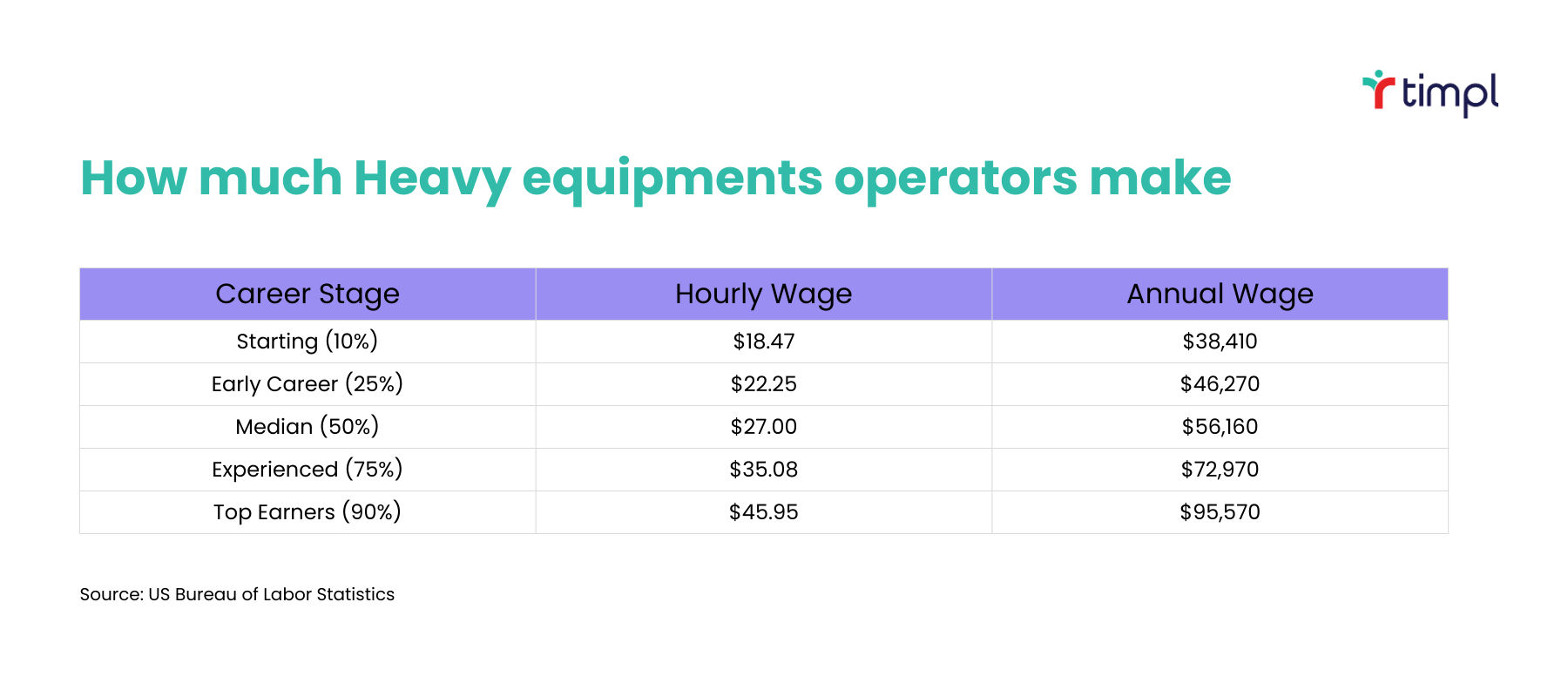How to Become Heavy Industrial Equipment Operators?
Walk past any construction site and you’ll notice the machines at work—bulldozers clearing ground, excavators lifting earth, cranes moving steel. None of it happens on its own. Every project relies on a heavy equipment operator, the person in the cab making sure the work gets done safely and efficiently.
It’s a career that often goes unnoticed, but without operators, roads, bridges, and buildings simply wouldn’t exist. And the best part? You don’t need a four-year degree to get started—just the commitment to train, focus on safety, and take on real responsibility.
What You’ll Learn in This Guide:
How much heavy equipment operators earn and job growth outlook
Best industries and states for pay and opportunities
Training paths: on-the-job vs. apprenticeships
Licenses and certifications that boost your career
Career advancement from entry-level to leadership
How much Heavy equipment operators make
The latest data from the U.S. Bureau of Labor Statistics (May 2023) shows there are about 450,000 operating engineers and other construction equipment operators working in the U.S. Pay varies by experience:
Note: Percentiles show how pay is distributed. For example, the 10th percentile means 10% of workers earn less and 90% earn more (entry level), while the 90th percentile means 90% earn less and only 10% earn more (top earners).
Most operators earn between $46,000 and $73,000 a year, while the top 10 percent approach six-figure salaries. That makes this a strong middle-class career with real upward potential.
Looking ahead, employment for heavy equipment operators is projected to grow about 4 percent from 2023 to 2033, adding more than 20,000 new jobs nationwide. This steady growth reflects ongoing investment in infrastructure, utilities, and construction projects.
Of course, pay isn’t the same everywhere. The type of project you work on — and the state you work in — can make a significant difference in your paycheck.
Check out Best Jobs in Industrial Machinery with and without a degree
Where the Jobs and Pay Are
The industry you choose shapes your paycheck. Highway and bridge construction offers steady demand, with average earnings around $72,000. Utility and energy companies are among the top-paying employers, often $80,000 or more, while local government jobs tend to pay less, closer to $56,000, but provide stability, benefits, and predictable hours.
Location matters as well. Texas employs more operators than any other state — over 49,000 — but average wages there hover near $50,000. In contrast, California combines high demand with some of the nation’s best wages, averaging nearly $88,000. States like New Jersey, Hawaii, and New York also pay well, with averages approaching $90,000.
It’s not just about big cities either. In states such as Wyoming, Alaska, and North Dakota, mining and energy projects create strong demand for operators, and wages there often reach into the $70,000s.
With competitive pay across industries and regions, the next step is understanding how to enter the field.
How to Become a Heavy Equipment Operator
If you’re wondering how to become a heavy equipment operator, the good news is you don’t need a college degree. What matters is training, safety awareness, and hands-on experience.
Training Options
There are two main ways to get started:
On-the-job training. Many new workers begin as laborers, assisting crews and learning the basics. Over time, they’re given the chance to operate smaller machines before moving on to bulldozers, excavators, and other heavy equipment. This route typically takes several months to a year.
Apprenticeships. A more structured option, often run by unions such as the Operating Engineers. Apprenticeships last 3–4 years and combine classroom lessons with paid site work. You earn a wage while learning and graduate with a credential that’s recognized nationwide. Programs can be found through union halls or Apprenticeship.gov.
Licenses and Certifications
Most employers require a Commercial Driver’s License (CDL) to transport equipment between sites. CDL training programs usually take a few weeks, depending on state requirements. Additional credentials can give you an edge in hiring and advancement:
OSHA 10- or 30-hour safety training proves you’re committed to safe practices.
NCCER Heavy Equipment Operator certification is industry-recognized across the country.
Work Environment
The role is hands-on and outdoors. Expect long days in heat, cold, dust, or rain. Operators wear protective gear daily and must work closely with crews, using signals and radios to coordinate safely. At first, the learning curve can feel steep, but with practice and guidance, most operators gain confidence quickly.
Career Path and Growth
Running heavy equipment is just the starting point. As you build experience and prove yourself on the job, you’ll open the door to bigger opportunities.
Lead Operator – After a few years in the field, you could move up to lead operator. In this role, you’ll train new workers and take on the more complex machines. Pay often climbs into the $70,000–$80,000 range, depending on where you work.
Foreman or Supervisor – With strong leadership skills and a solid safety record, you could step into a supervisor role, managing crews and coordinating daily work. Many operators reach this level within 5–10 years, and the pay is higher than the operator average.
Superintendent or Project Manager – If you want to run entire job sites, budgets, and schedules, this is the next step. These roles usually require both years of experience and some additional training in management or safety. In larger markets, salaries can reach into the six figures.
You’re not limited to management either. Some operators shift into training or safety inspection, while others use their skills to launch their own contracting business. With time and commitment, you can shape this career to fit your goals — whether that’s climbing into leadership or building something of your own.
What Seasoned Heavy Equipment Operators Want You to Know
A CDL gives you an advantage. Employers value operators who can haul machines to the job site as well as run them once they’re there.
You’ll start small. Most people begin with basic equipment like loaders or haul trucks and work their way up to dozers and excavators.
Safety always comes first. The fastest way to stall your career is by rushing. Experienced operators stress that careful, steady work is more respected than speed.
Consistency matters. Reliability — showing up on time, following instructions, and taking care of the equipment — is what earns trust and opens the door to bigger machines and leadership roles.
FAQs About Becoming a Heavy Equipment Operator
1. How long does it take to become a heavy equipment operator?
On-the-job training can take several months to a year. Apprenticeships usually last 3–4 years, but you earn wages while you learn.
2. Do I need a license or certification?
Most employers want you to have a Commercial Driver’s License (CDL), especially for moving equipment between sites. Safety cards like OSHA 10 or 30 and credentials such as the NCCER Heavy Equipment Operator certificationcan give you an advantage.
3. How much do heavy equipment operators make?
Most earn between $46,000 and $73,000 a year, while top operators can approach six figures, depending on industry and location.
4. Where are the best-paying jobs?
States like California, New Jersey, Hawaii, and New York pay the most, averaging $85,000–$90,000. Rural states with mining and energy jobs — like Wyoming, Alaska, and North Dakota — also offer high pay.
5. Is heavy equipment operation a good career choice?
Yes. It’s a stable, in-demand job with strong pay, advancement opportunities, and no college degree required.
Looking for your next thriving job? Explore your opportunities with TIMPL.
Related Resources
Interview Tips
10 Tough Interview Questions Recruiters Love to Ask
How to Decline a Job Offer the Right Way
How to Accept a Job Offer (Without Second-Guessing Yourself Later)
How to Ask Your Boss for a Raise
Exit Interview Checklist with Examples
How to follow up after a job interview
How To Negotiate Salary (using power dynamics)
Do You Still Need an Objective on Your Resume?
Career guide
Why Electrical and Electronic Assembler Jobs are Booming
What Does a Millwright Do? A comprehensive guide
What Is a Machinist and What’s the Future of This Career?
What It’s Really Like to Be a QC Inspector in Manufacturing
What Is a Pipefitter and Is It a Good Career?
The Wind Turbine Technician Career: Everything You Need to Know


